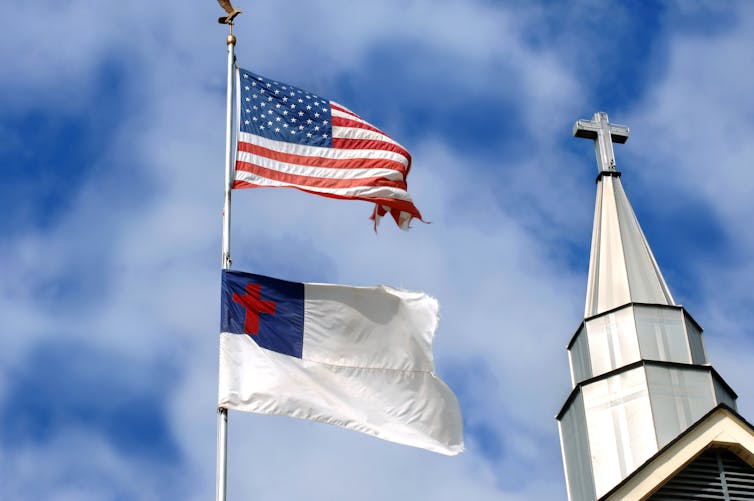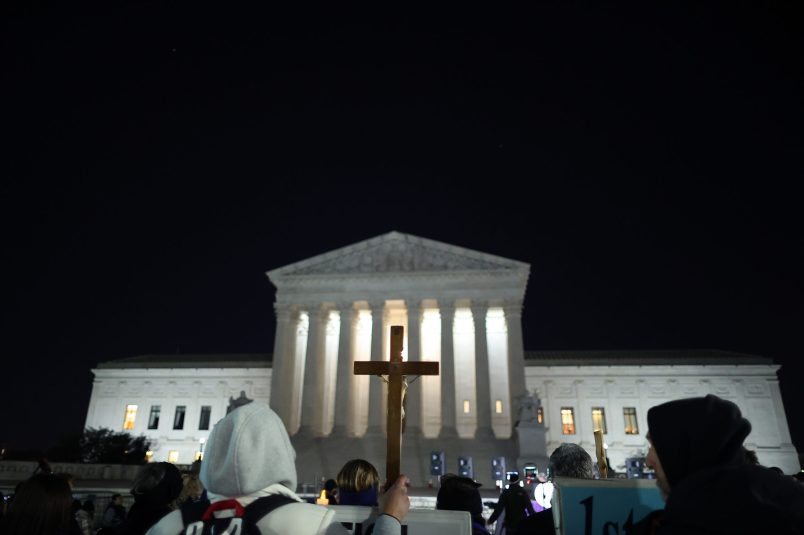This article is part of TPM Cafe, TPM’s home for opinion and news analysis. It first appeared at The Conversation.
There are three flagpoles outside Boston City Hall. One flies the United States flag. Another flies the Massachusetts state flag. What can – and can’t – fly from the third is an issue being taken up by the Supreme Court.
On Jan. 18, 2022, the Supreme Court will hear oral arguments in Shurtleff v. Boston. The case addresses whether the city violated the First Amendment by denying a request to temporarily raise the Christian flag on a flagpole outside City Hall, where Boston has temporarily displayed many secular organizations’ flags.
The case raises important questions about free speech at a time when many members of the Supreme Court seem concerned about restrictions on religion. The court’s decision will likely clarify one or more free speech doctrines, impacting how courts nationwide interpret the First Amendment’s guarantees.
Shurtleff v. Boston also highlights disagreements about the nature and scope of freedom of speech, the kind of disputes I study in my work on free speech and the First Amendment.
Case background
Boston permits groups to request that a flag temporarily fly alongside the American and Massachusetts flags at City Hall to mark special occasions, replacing the city flag that usually occupies the third post. Past examples include flag requests from the Chinese Progressive Association and the National Juneteenth Observance Foundation.
In 2017, Camp Constitution, a New Hampshire-based organization, requested to fly the Christian flag, which has a cross in the upper left corner and was designed by a Sunday school teacher and a missionary executive in the late 1800s. Today, some Protestant denominations display the flag inside their churches.
Camp Constitution asked to fly the flag as part of a planned event “to celebrate the civic contributions of Boston’s Christian community.” The organization says its mission is “to enhance understanding of our Judeo-Christian moral heritage, our American heritage of courage and ingenuity, including the genius of our United States Constitution, and the application of free enterprise.”
Boston denied the request. The city cited concerns that raising the Christian flag at Boston City Hall would violate the First Amendment’s establishment clause, which bars the government from promoting particular religions over others. After making a second request, which Boston also denied, Camp Constitution sued.
A federal district court and the First Circuit Court of Appeals sided with Boston on the grounds that flying a flag on the third flagpole was government speech, not private speech – and therefore the city was entitled to refuse to fly the Christian flag on its flagpole.
Camp Constitution appealed to the Supreme Court, which granted review.
The case’s outcome will likely hinge on the Supreme Court’s determination of whose views are represented by the flagpole outside City Hall: the private organization whose flag is temporarily flying, or the government. In other words, this case is about who is “speaking” when that flag goes up, and whose free speech rights are protected.
If the court determines that Camp Constitution is speaking, then a framework the court has developed, known as the “public forum doctrine,” will apply. This would likely result in a ruling favoring Camp Constitution.
If the court determines that the city of Boston is speaking, then the court’s government speech doctrine will apply. This would likely result in a ruling favoring Boston.
Public forum doctrine
Federal, state and local governments oversee a wide variety of public spaces, such as parks, universities and courthouses, just to name a few. These areas serve different functions, some of which require more regulation of speech than others.
The Supreme Court has organized government spaces into several categories, each of which permits different types of restrictions on free speech. This set of categories and permitted restrictions is referred to as the public forum doctrine.
Spaces like public parks and sidewalks are considered public forums, the category that permits the fewest restrictions on speech. In a public forum, a government can never restrict speech based on viewpoint – specific positions on a topic – and is severely limited as to when it can restrict speech based on content – a given topic.
Normally, a flagpole outside a city hall would not be considered a public forum. However, the Supreme Court also recognizes a separate category, “designated public forums,” which are spaces the government converts into public forums. In a designated public forum, free speech regulation is limited in the same way it would be in a public forum.

In Shurtleff v. Boston, both parties agree that the area surrounding the flagpole is a public forum. But they disagree over whether the flagpole itself is a designated public forum. Camp Constitution argues that Boston has turned the flagpole into a designated public forum by allowing other groups to fly their flags there. Meanwhile, Boston argues that it has not, because the city retained control by permitting limited types of groups to raise their flags.
Camp Constitution notes that Boston previously approved 284 requests to raise other flags, and that there is no record of a prior request being denied.
But Boston counters that none of those previous requests were for religious flags. The city argues that only two types of flags have been permitted: flags representing territories, nations and ethnicities, and flags associated with publicly recognized days of observance, such as Veterans Day and LGBTQ Pride Month. Boston argues that such limited categories of approval are not what one would expect in a designated public forum, and that this is evidence that Boston has not turned its flagpole into a designated public forum.
Government speech doctrine
Over 30 years ago, in Rust v. Sullivan, the Supreme Court recognized that the government itself is a speaker with First Amendment rights – an idea known as the government speech doctrine. Government speech is not subject to the public forum doctrine. Instead, the government has much greater discretion in deciding which messages it endorses.
Boston argues that raising a flag on the third flagpole at City Hall is government speech and therefore the city has the right to determine what views it wants to express on its flagpole. Camp Constitution disagrees, maintaining that the flagpole is a designated public forum and therefore few restraints on private groups’ free speech are allowed on the flagpole.
Both parties’ arguments rely on competing interpretations of the government speech doctrine put forward by the Supreme Court in two cases, Pleasant Grove v. Summum and Walker v. Texas Division, Sons of Confederate Veterans.
In 2009, the Supreme Court held in Pleasant Grove v. Summum that the permanent monuments in a park owned and operated by the town were government speech. The Supreme Court’s unanimous decision allowed the town to deny a request from a small religious group, Summum, to install a permanent monument expressing its beliefs, even though the park had previously accepted a monument of the Ten Commandments.
In 2015, the Supreme Court held in Walker v. Texas Division, Sons of Confederate Veterans that license plates were government speech. This permitted Texas to deny a request for a specialty license plate featuring the Confederate flag, even though Texas offered a wide range of other specialty plates. Unlike Pleasant Grove v. Summum, this case was decided by a slim 5-4 majority.
Shurtleff v. Boston will likely require the court to further clarify the government speech doctrine. The central issue is this: When another flag temporarily replaces Boston’s own, who is speaking?
Mark Satta is an assistant professor of philosophy at Wayne State University.
This article is republished from The Conversation under a Creative Commons license. Read the original article.







A few years ago the Supreme Court ruled in favor of Texas, that refused to allow the Sons of Confederate Veterans to participate in the state’s license plate program, that raises money for various non-profits. The reasoning, as I recall, was that the license plates, issued by the State of Texas, were the government’s own speech, and therefore the state could decide what it did or did not want to put out.
That was a reasonable decision, and seems to me should apply here, as well.
Anyone wanna bet on how this will be found?
Wasn’t there the case a few years ago regarding Ten Commandments outside courtrooms? Is the Christian Taliban trying to galvanize that ruling?
Much as I disagree with Scalia, I agree with this quote from him:
“What distinguishes the rule of law from the dictatorship of a shifting Supreme Court majority is the absolutely indispensable requirement that judicial opinions be grounded in consistently applied principle.”
Wait, I thought the Stars and Stripes already WAS the Christian Flag?
Or vice versa…
I’ll bet 10 Quatloos that the “Christian flag” won’t be allowed, on the grounds that not even this court will say that’s the only one that can be used, and they won’t want to deal with the Satanists wanting equal time on the flag pole.